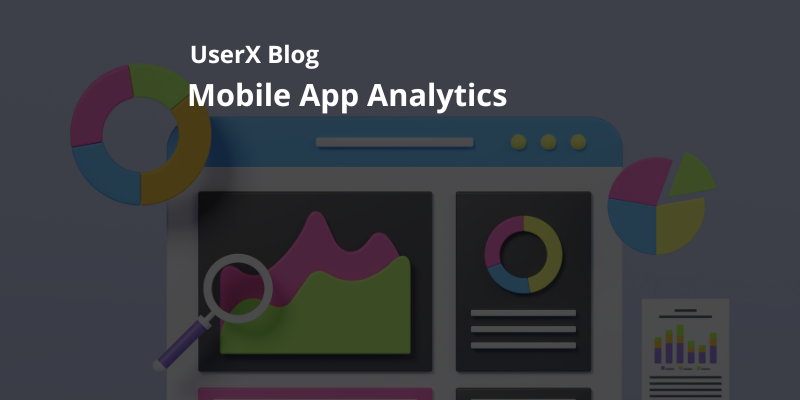In the current digital landscape, where mobile applications have become essential, comprehending user behavior through comprehensive mobile app analytics is key to success. With the escalation in mobile analytics usage, driven by technological progress and a growing dependence on smartphones, the marketplace has become highly competitive. This environment demands a more profound understanding of user engagement and preferences, positioning mobile app analytics as an essential tool. Businesses, utilizing app analytics tools effectively, can adapt their applications to align better with user needs, distinguishing themselves in the competitive market. The application of mobile app analytics is not limited to unraveling user behavior; it also leads to improved user experiences, marking its significance in the development of successful mobile applications
What is Mobile App Analytics?
Mobile app analytics, an integral component of modern app development, empowers developers and marketers to dissect and comprehend the entire user journey within an app. Central to this are app analytics tools, which track and decode user interactions, from their navigation paths to their most frequented features. This in-depth exploration with mobile analytics not only uncovers the content that engages users but also sheds light on areas causing user struggle or loss of interest. The value of mobile app analytics is rooted in its profound capacity to reveal detailed insights into user behavior. Gaining this understanding enables app developers and businesses to pinpoint both the strengths and shortcomings of their app's design and functionality. This insight is pivotal in formulating strategies that enhance user experience, boost retention rates, and secure a competitive edge in the dynamic digital marketplace.
Benefits of Using Mobile App Analytics
Employing mobile app analytics tools brings a multitude of advantages, crucial for app optimization and business growth. Firstly, these tools offer real-time data, crucial for understanding user preferences and behaviors. Such precise data collection by app analytics tools is instrumental in addressing app issues, planning updates, and enacting pertinent modifications.
Next, mobile analytics assists in pinpointing the most effective acquisition channels, which is vital for aligning marketing strategies with budget constraints and enhancing customer lifetime value. This strategic use of mobile app analytics plays a pivotal role in optimizing marketing efforts.
Furthermore, by dissecting the full user journey, mobile app analytics provide insights that lead to improved user engagement and increased retention rates. These analytics tools help in identifying areas needing enhancement, thus fostering more robust user interaction and loyalty.
Lastly, the analytics enable the creation of tailored user experiences. By understanding user profiles and behaviors through mobile app analytics, businesses can develop targeted marketing strategies. This results in a more personalized customer experience, augmenting the likelihood of conversions and fostering deeper user connections.
Selecting the Right Analytics Tool for Your App
Selecting the appropriate app analytics tools for your mobile app is a decision of paramount importance, influencing the app's overall success. It's crucial to consider a variety of factors to ensure that the chosen mobile app analytics tools align perfectly with your app’s specific needs and objectives.
Key considerations include:
Specific Needs and Objectives: Identify which metrics and insights are vital for your app. Different app analytics tools specialize in various aspects, such as user behavior tracking, crash reporting, session recording, and more. Choosing the right tool depends on these specific requirements.
Integration Capabilities: Assess how well the analytics tool integrates with your app’s existing infrastructure and other software you might be using. The seamless integration of mobile analytics tools is crucial for efficient data collection and analysis.
User Interface and Ease of Use: The user interface and usability of the analytics tools are significant. A user-friendly and intuitive interface in app analytics tools can save substantial time and effort during data analysis.
Data Privacy Compliance: Ensure that the chosen app analytics tools comply with relevant data privacy laws, such as GDPR in Europe or CCPA in California. This is especially important in managing user data responsibly and ethically.
Performance Impact: Evaluate how the analytics tool impacts your app’s performance. App analytics tools that are resource-intensive might adversely affect app speed or user experience, particularly on older devices.
Moreover, when effectively implementing mobile app analytics tools, set clear business goals and align them with appropriate KPIs. Starting with a few key metrics and gradually expanding your analysis is advisable. Adopting a holistic approach, regularly reviewing the gathered data, and
Common Challenges and Solutions in Mobile App Analytics
Embarking on the journey of mobile app analytics presents a set of unique challenges. Addressing these challenges effectively is critical to unlocking the full potential of mobile analytics tools. Here are some common challenges and their solutions:
Data Privacy and Compliance Challenges
Challenge: Navigating the complex landscape of data privacy laws, such as GDPR and CCPA, poses significant challenges in collecting and analyzing user data compliantly.
Solution: Opt for app analytics tools that prioritize data privacy and offer robust features for managing user consent. Maintain transparency with users about data collection and usage, and implement secure and anonymized data handling practices.
User Consent Management
Challenge: Balancing the need for data collection with maintaining an unobtrusive user experience can be tricky.
Solution: Create clear, non-intrusive user consent prompts, explaining the benefits of data collection for enhancing user experience, and offer users control over their data. Impact on Device Performance:
Challenge: Certain analytics tools, especially those with advanced features like session recordings, can strain device resources, leading to issues such as battery drainage, increased data usage, and slower app performance.
Solution: Choose lightweight mobile analytics solutions that minimize performance impact, adopt efficient data collection methods, and ensure the analytics SDK is optimized for performance. Balancing Detailed Data Collection with Performance:
Challenge: Collecting comprehensive data for in-depth analysis can sometimes conflict with the goal of maintaining optimal app performance.
Solution: Utilize mobile app analytics tools that offer flexible data collection options, allowing customization of data sampling rates and selective event tracking to balance detail with performance needs.
Ensuring Accurate and Relevant Data Collection
Challenge: Amassing vast amounts of data can lead to information overload, making it challenging to derive meaningful insights.
Solution: Concentrate on collecting data that aligns with specific KPIs and business goals, and regularly revise your data collection strategy to keep it relevant and focused. By understanding and effectively navigating these challenges, businesses can maximize the benefits of their mobile app analytics endeavors, leading to improved app performance, enhanced user experiences, and better overall business outcomes.
Looking for mobile app analytics tool? Try UserX with 2-weeks free trial and get full access toUserX is a comprehensive solution that provides growth-oriented insights for mobile app teams.
- Video Session Recording
- Heatmaps
- Crash analytics
- Drop-off flows
- Conversion funnels
- User flows maps
Try for free
Future Trends in Mobile App Analytics
The landscape of mobile app analytics is continuously evolving, shaped by technological advancements and changing user behaviors. Here are some key trends that are expected to shape the future of mobile analytics:
Increased Emphasis on User Privacy: In response to rising data privacy concerns, future app analytics tools are likely to focus more on user consent and privacy. This shift could involve more transparent data collection practices and the adoption of privacy-first analytics methodologies.
Advanced AI and Machine Learning Integration: The incorporation of AI and machine learning in mobile app analytics tools is anticipated to grow more sophisticated. Such advancements will enhance predictive analytics, offering deeper and more precise insights into user behavior and app performance.
Cross-Device and Cross-Platform Analytics: As users increasingly interact with apps across various devices and platforms, mobile analytics tools will need to evolve to offer more comprehensive cross-platform tracking. This will provide a more holistic view of user behavior across different devices.
Enhanced Real-Time Analytics: There is an expected increase in demand for real-time data processing and analytics. Real-time capabilities in mobile app analytics tools will enable businesses to make quicker, more informed decisions based on up-to-the-minute user data.
More Personalized User Experiences: Analytics tools will become increasingly adept at facilitating personalized experiences for users. By leveraging insights into individual user preferences and behaviors, apps can tailor content and features more effectively to each user.
Voice and Conversational Analytics: As voice assistants and chatbots gain prevalence, analytics tools are likely to evolve to better interpret these types of interactions, providing unique insights into user preferences and behaviors.
Automated Insights and Recommendations: Future mobile app analytics tools might offer more automated insights and actionable recommendations. This automation will reduce the need for manual data analysis, allowing businesses to focus more on strategy and implementation.
Greater Integration with Marketing Tools: Expect to see closer integration between analytics platforms and marketing tools, enabling more coordinated and data-driven marketing strategies.
These trends indicate a future where mobile app analytics becomes even more integral, intelligent, and user-centric, driving innovation and efficiency in app development and marketing strategies.



